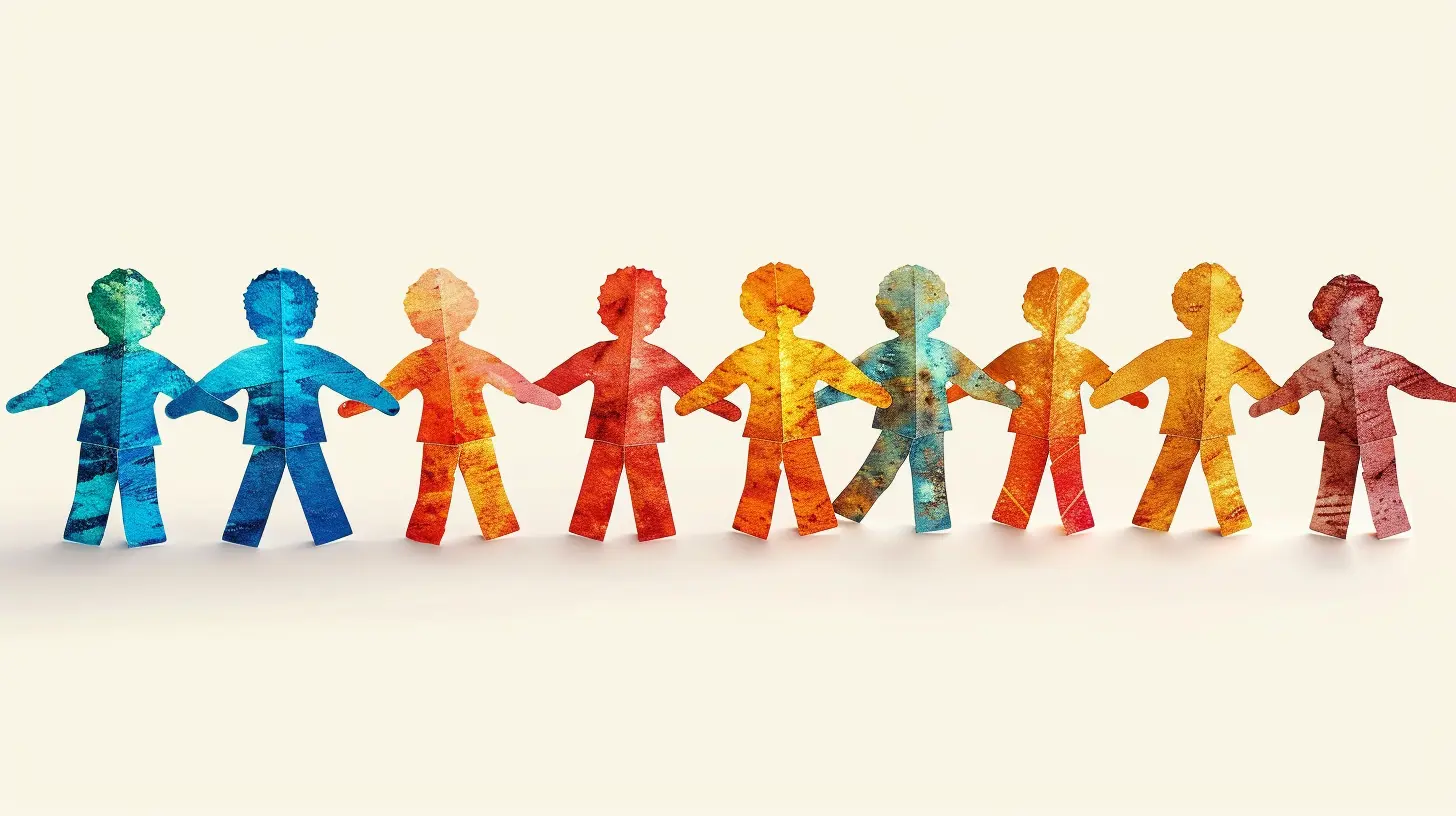Social Support and the Role of Friendship in Mental Health
27 November 2025
Let’s be real—life can throw some serious punches. Whether it's work stress, relationship drama, or just feeling off, navigating the ups and downs alone can feel overwhelming. That’s where social support kicks in, and yep, we’re talking about friendship too. The truth? Meaningful connections can be a game-changer for your mental health.
In this article, we’ll break down how social support—and especially strong friendships—affect your mental well-being. We’ll also talk about why your social circle could be just as important as therapy. So, grab a cup of something cozy and let’s dive in.
What Exactly Is Social Support?
Think of social support as your emotional safety net. It’s the people you turn to when life gets heavy, when you need advice, or when you just want to vent.There are a few types of social support:
- Emotional support: Listening, comforting, empathizing
- Instrumental support: Practical help, like picking you up from the airport or bringing soup when you're sick
- Informational support: Guidance, feedback, or advice that helps solve problems
- Appraisal support: Encouragement and feedback that helps you self-evaluate
When you have a mix of these, you’re better equipped to handle life’s curveballs.
Why Support Systems Matter for Mental Health
Let’s face it—humans aren't built to go it alone. We are wired for connection. When we feel supported, our stress levels go down, our mood lifts, and we’re more resilient. It’s science.Here’s how good social support can improve mental wellness:
- Reduces stress: Talking things out calms the nervous system down
- Lowers risk of anxiety and depression: Feeling seen and heard can act as a buffer against mental illness
- Boosts self-esteem: Encouragement makes you feel capable and confident
- Improves coping skills: Knowing you have backup makes problems feel less intimidating
In contrast, lacking support can increase feelings of loneliness, which is linked to everything from depression to heart disease. It’s seriously not something to overlook.
Friendship: The Unsung Hero of Mental Health
Friendship goes beyond just having a buddy to hang with on weekends. A real, solid friendship can act like emotional armor in tough times.So, what does a healthy friendship actually look like?
- It feels easy: You can be yourself without worrying about judgment
- It’s mutual: There’s give and take—no one’s doing all the heavy lifting
- It’s consistent: They show up. You show up. Simple as that.
- It’s supportive: No toxic vibes, just encouragement and respect
True friendships offer a safe space to open up, work through emotions, and feel understood. That kind of connection is priceless when it comes to mental health.
Friends vs. Family: Do They Serve Different Roles?
Here’s a twist—studies show that friends can sometimes offer better emotional support than family. Why? Because friendship is a voluntary bond. You're choosing each other, not stuck together by blood or obligation.That said, family can still be an amazing support system. But sometimes, friends "get" you in ways family might not. You might share similar life experiences, values, or just have more open conversations.
Bottom line? You need both—friends and family. It’s not either-or; it’s about building a rich support network.
How Friendship Impacts Specific Mental Health Issues
1. Depression
Ever had a friend pull you out of a funk with just a text or a coffee date? That’s no small thing.Friendships reduce isolation, which is a major contributing factor to depression. Regular interaction with friends can help shift negative thinking patterns and add positivity to your day, even when life feels grey.
2. Anxiety
When anxiety tells you the worst-case scenario is coming, a good friend tells you to breathe and take things one step at a time. Friends can offer grounding and perspective you can’t always find on your own.3. Stress
Friends are natural stress relievers. Hanging out, laughing, venting—it all helps you decompress. Social time can even lower cortisol (your body's primary stress hormone).4. Loneliness
Here’s the thing about loneliness: it’s not just about being alone, it’s about feeling disconnected. Even a few deep, meaningful friendships can fill that emotional void and help you feel seen.The Science Behind It All
Alright, let’s sprinkle in a little science. Research consistently shows that social support is linked to lower cortisol levels, better immune response, and even longer life. According to a Harvard study spanning decades, good relationships—not wealth or fame—are what keep people happy and healthy over the long haul.In brain terms, connection releases feel-good chemicals like oxytocin and dopamine. It's like a natural antidepressant—without the side effects.
What If You Struggle to Make or Keep Friends?
Not everyone has a bustling social life, and that’s okay. Making and maintaining friendships can be tough, especially if you’re introverted, busy, or have social anxiety.Here are a few tips to get started:
- Start small: Comment on someone’s post, join a hobby group, or strike up a convo at work
- Be vulnerable: Real friendships come from real talk, not surface-level small talk
- Be consistent: Friendships grow over time. Don’t ghost people or only reach out when you need something
- Reach out first: Someone’s gotta make the first move. Why not you?
Remember, it's more about quality than quantity. One or two solid friendships can be more powerful than a dozen acquaintances.
Digital Friendships—Do They Count?
Absolutely. In this digital age, meaningful connections happen online all the time. Whether you're bonding over shared memes or having deep heart-to-hearts on video calls, digital friendships can be just as emotionally fulfilling.Just make sure there's balance. Too much screen time without face-to-face interaction can leave you feeling more disconnected. Use tech to supplement your social life, not replace it entirely.
When Friendships Turn Toxic
Let’s not romanticize friendships—sometimes, they're not good for your mental health. If a friendship:- Leaves you feeling drained or worse about yourself
- Involves constant drama or manipulation
- Lacks mutual respect or support
…it might be time to reevaluate. It's okay to outgrow people. Letting go of toxic connections can be just as important for your mental health as building new ones.
How to Be a Better Friend (And Get More in Return)
Want stronger social support? Start by giving it.Here’s how to level up your friend game:
- Be a good listener: Don’t just wait to talk. Really hear them.
- Be available: Check in. Show up. Make time.
- Be honest: Vulnerability fosters trust.
- Be uplifting: Celebrate their wins. Encourage their goals.
When you show up for others, they’re more likely to show up for you. It’s a two-way street.
Mental Health + Friendship = A Stronger You
Friendship isn’t just a nice-to-have. It’s an essential ingredient for emotional well-being. Whether you're battling anxiety, dealing with depression, or just having a rough day, your social circle can be your lifeline.So, don’t brush off that next hangout invite. Call your old college buddy. Join that book club. Because those connections? They’re not just going to boost your mood—they’re going to strengthen your mind.
Final Thoughts
At the end of the day, mental health is complex—but connection makes it simpler. You don’t need a hundred friends to feel supported. Just a few solid ones who get you, who listen, who show up? That’s gold. And your brain, heart, and soul will thank you for it.So go ahead—nurture your friendships like you would a plant. Water them often, tend to them gently, and keep them in the sunlight of your life.
all images in this post were generated using AI tools
Category:
Mental WellnessAuthor:

Sophia Wyatt
Discussion
rate this article
1 comments
Phaedra Garcia
Friendship significantly enhances mental health by providing emotional support, reducing stress, and fostering resilience during challenging times. Nurture these vital connections!
November 27, 2025 at 4:07 AM

Sophia Wyatt
Thank you for highlighting the crucial role of friendship in mental health! Nurturing these connections is indeed essential for emotional well-being.


